News

Image Alt Text: Image of the concrete dome on top of the Washington State Capitol Legislative Building. The dome has a smooth, round shape that comes to a point at the top and sits on a ring of decorative columns. It’s an overcast, cloudy day and there are trees around the building.
Hunger Action Day 2025: Advocating for a Hunger-Free Washington
Hunger Action Day is an annual event that serves as a platform for everyday people, community organizations, and advocacy groups to come together to urge legislators to prioritize the well-being of the vulnerable and fight hunger through tangible policy solutions. Hunger Action Day, held on February 24th, 2025, brought together 220 passionate advocates to the state capital, Olympia, to speak out for those facing hunger and poverty across Washington. It is a powerful reminder of the work that needs to be done to ensure that everyone, regardless of age, race, or background, has access to the basic human rights of food, shelter, and health.
Despite a rainy morning, the enthusiasm of the participants remained unwavering. Members of the Seattle Food Committee, a crucial part of the movement, met at Food Lifeline and carpooled or hopped onto the chartered bus provided by Solid Ground and headed down to Olympia. The day began at the United Church of Olympia, where participants were briefed by Claire Lane on the AHNC (Anti-Hunger and Nutrition Coalition) legislative agenda and trained on best practices for speaking with lawmakers. Constitutes then shared stories about how policy and funding changes have affected and will affect their programming. Together, they raised their voices in solidarity for a better future for all.
After the morning briefing, constituents met together with other participants from their legislative districts to go over their daily session schedules and strategize together on how best to advocate for their community with their district representatives. Participants took turns leading discussions on how key policies would affect their communities and urged legislators to vote in support of vulnerable members of their districts. Throughout the day participants reflected together on the empowering experience of collective advocacy.
Read More
Key Policy Priorities for Hunger Action Day
Several policy priorities are at the forefront of Hunger Action Day advocacy efforts. These priorities focus on meeting the most pressing needs of our community members and addressing systemic issues that contribute to hunger and poverty. Some of the key policy initiatives include:
- Free School Meals for All Kids (HB 2058/SB 5964) to ensure all children are fed and ready to learn.
- Summer EBT to ensure children continue to receive food support over the summer months.
- Extending the Emergency Food Assistance Program (EFAP) for food banks and food pantries.
- Investing in Senior Nutrition Programs to ensure seniors are not left behind.
- Fully Funding Basic Needs for College Students to help them succeed without worrying about where their next meal comes from.
- Housing Security & Rent Stability (HB 2114/SB 5961) to ensure that housing costs do not push families into food insecurity.
- Supporting TANF (Temporary Assistance for Needy Families) (HB 2007 & HB 1652) To support families in need of financial assistance.
- Expanding Access to the Working Families Tax Credit (HB 1075/SB 5249) to support younger, working adults, and seniors provide for their families.
- Basic Income Pilot Program (HB 1045) to provide regular and unconditional income to individuals and families experiencing poverty.
- Sustainable Revenue for a Healthy, Hunger-Free Washington (HB 2276/SB 6191, HB 1473, SB 5770) to create a more fair and balanced tax system.
These policy goals work in tandem to ensure that everyone in our state has access to healthy food, safe housing, and a strong support system.
A Struggling Budget: Finding Solutions for a Hunger-Free Future
The state of Washington is currently facing a significant budget deficit, estimated at $15 billion. As legislators navigate this budget crisis, there is a strong push from advocates to ensure that human services, such as food assistance and housing programs, are not cut in the process. Rather than relying on cuts that disproportionately impact vulnerable communities, advocacy efforts focus on closing tax loopholes, raising sustainable revenue, and implementing progressive tax policies that do not place the burden on low- and middle-income families. During Hunger Action Day, advocates made it clear that we need progressive policies that protect food, shelter, and health services and ensure that the people who rely on these services continue to receive support, even during tough economic times.
Powerful Stories: The Impact of Hunger and Advocacy
Throughout the day, speakers shared compelling stories of how hunger and food insecurity impact different groups of people, highlighting the need for increased support.
- Kate White Tudor, from the WA Association of Area Agencies on Aging, spoke about the rising rates of hunger among seniors and the importance of senior nutrition programs. During the pandemic, more seniors than ever have found themselves struggling to access enough food. For many seniors, these programs are their only source of nutrition and social interaction. Kate shared powerful stories, such as “Juan’s” recovery from prediabetes after attending group meals and “Mary’s” emotional healing through shared meals and support after losing her husband.
- Michelle Thomas, from the Washington Low Income Housing Alliance, highlighted the connection between housing and food security. With increasing housing costs, more people are forced to choose between paying for rent or buying food and medicine. Michelle emphasized that rent stabilization is urgently needed, as 72% of voters across Washington support it.
- Sara Seelmeyer, from United Way of King County, focused on the importance of passing the Free School Meals for All and the Summer EBT program, which would provide additional food resources for children during the summer months. Sara noted that food insecurity is not limited to the school year, with many kids relying on summer meals and weekend food programs.
Advocacy in Action: How You Can Help
Hunger Action Day is a chance for all of us to make our voices heard in support of those struggling with hunger. Here are a few ways you can get involved:
- Reach out to Your Legislators: Contact your district representatives and let them know how important these policy priorities are to you.
- Support Key Bills: Sign on to support bills that fight hunger and advocate for vulnerable populations.
- Testify in Support: Whether in person or virtually, testifying about the importance of these policies can make a real impact.
- Encourage Others to Get Involved: Tell friends in other districts to reach out to their representatives, amplifying the collective voice of advocacy.
Unsure which legislative or congressional district you live in? Use the District Finder on the Washington State Legislature website to find out.
A Personal Story: Stepping Up for Change
Megan Boyce-Jacobs, Food Bank Coordinator at YWCA (a member of SFC), and a participant from the 43rd Legislative District, shared her experience of stepping out of her comfort zone to advocate for hunger-related policies. Initially nervous about joining the advocacy efforts, Megan soon found herself empowered to speak up and contribute her thoughts, particularly on the issue of taxes. She found the advocacy process approachable and appreciated the preparation provided by organizers, which made it easier to engage with legislators confidently. Megan’s story is a reminder that advocacy can be fun, educational, and most importantly, effective. By joining together and sharing our voices, we can make meaningful change.
Conclusion: Our Voice, Our Government
As Hunger Action Day wrapped-up, it became clear that the fight against hunger requires more than just policy changes—it requires a collective commitment to ensuring that every individual has access to the basic needs that all human beings deserve: food, shelter, health, and dignity. It’s not just about speaking out on Hunger Action Day—it’s about consistently reaching out to your legislators, telling your story, and pushing for policies that prioritize the well-being of the most vulnerable in our communities. By standing together, we can build a hunger-free future and advocate for policies that support the most vulnerable members of our community. Remember, this is our government. These are our halls. When we come together and speak up, we can make a real difference. Let’s keep the momentum going and continue advocating for a hunger-free, healthier, and more equitable Washington for all.
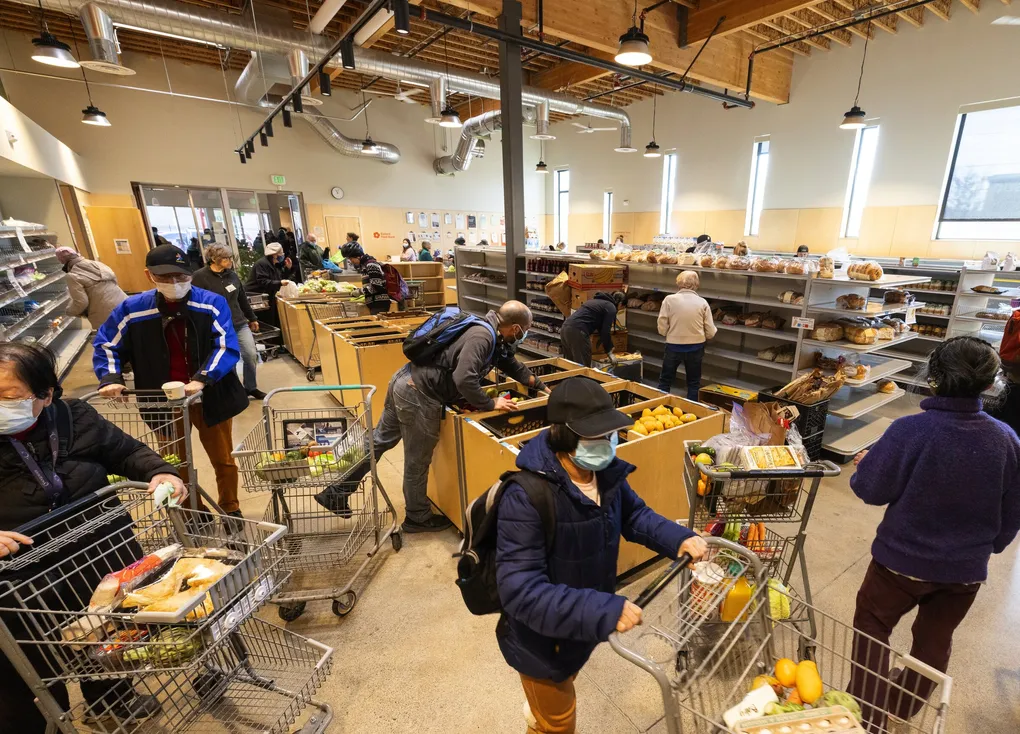
Image Alt Text: Image of the Ballard Food Bank showing a crowd of about 20 people putting groceries into their shopping carts. There are shelves of bread, produce, and canned goods. A checkout area is in the back of the room.
As more of our neighbors go hungry, WA lawmakers must do better
The Seattle Food Committee and Sound Generations recently published an Op-Ed in the Seattle times. Click here to read the article on the Seattle Times website. The full text of the article is below.
Hunger is on the rise, and the programs that serve hungry people in our state need significant investments to keep up with current demand. Food banks and meal programs are on the front lines of an unprecedented hunger crisis, yet Gov. Bob Ferguson recommended $52 million in budget cuts for food banks. At the same time, Congress approved a budget plan that slashes $230 billion from SNAP, the Supplemental Nutrition Assistance Program. Our hungry neighbors need our elected leaders to do better.
People are struggling to put food on their tables as prices — and economic uncertainty — keep rising. Last year, visits to food banks rose 26% statewide, reaching a staggering 13.4 million visits, a huge increase from the 2014-2022 average of 8.2 million. Families with young children, seniors on fixed incomes and workers whose wages haven’t kept up with the cost of living are turning to food assistance programs in record numbers.
Seniors are the fastest-growing demographic among new food bank clients. For the first time in a decade, one in 10 Washington seniors live in poverty. Demand for senior nutrition programs has surged, with services like Meals on Wheels, grocery delivery and senior center meals providing over 3.2 million meals statewide. In King County alone, Sound Generations served over 620,000 meals last year, yet their Meals on Wheels program still had a six-month waitlist, leaving 600 seniors without the help they need.
Read More
Behind every statistic are real stories of need. A visitor to a local food bank shared: “This food has helped me through a difficult transition after an injury and a job loss. Thank you for being there for me and my family.” Members of the Seattle Food Committee, a coalition of 28 food banks, hear these stories from our clients every day.
This isn’t a temporary surge in demand — this is the new reality, and the Legislature’s investments must reflect this scale and urgency. During a recent news conference, Gov. Ferguson suggested faith communities could help fill the gap created by his proposed $52 million cut to food banks. While faith-based organizations are valued partners in feeding the hungry, they are already stretched to their limits. Charity cannot replace strong public policy solutions or the need for progressive revenue to ensure a stable and just safety net for all.
Recent data from the University of Washington’s WAFOOD project underscores the need for further investments in food assistance. The first survey in the summer of 2020 found that 30% of respondents were food insecure. After significant federal aid arrived, the December 2020 survey showed a small decrease. Now, with state and federal assistance dwindling or ending and prices rising, last month’s survey showed food insecurity rates have nearly doubled to 55%, affecting over two-thirds of households with children. Nearly half had difficulty affording groceries, and three-quarters of food-insecure people reported cutting back on the quality and quantity of food.
These numbers paint a stark picture: Hunger is a widespread reality across our state, it reaches beyond the income limits for nearly every form of public assistance and it’s directly tied to the rising cost of living. Legislators must respond by prioritizing investments in meals for kids and seniors, food banks for all, and stretching SNAP.
We recognize that the Legislature faces difficult choices. But these are not just fiscal decisions — they’re moral ones. Food is not a luxury but a basic human right. Access to food shapes every aspect of well-being, from health and academic success to long-term economic mobility. Food insecurity hits hardest in communities of color, immigrant households and low-wage households, deepening existing racial and economic inequities. A just budget, supported by equitable revenue solutions, can help close those gaps and ensure no one in our state goes hungry.
Our state has the opportunity and responsibility to protect children, families, and seniors from hunger. This is Washington’s moment to lead.
Marcia Wright-Soika: is executive director of FamilyWorks and co-chair of Seattle Food Committee, a coalition of 28 Seattle food banks.
Jim Wigfall: is CEO of Sound Generations, a nonprofit serving older adults and caregivers in King County.
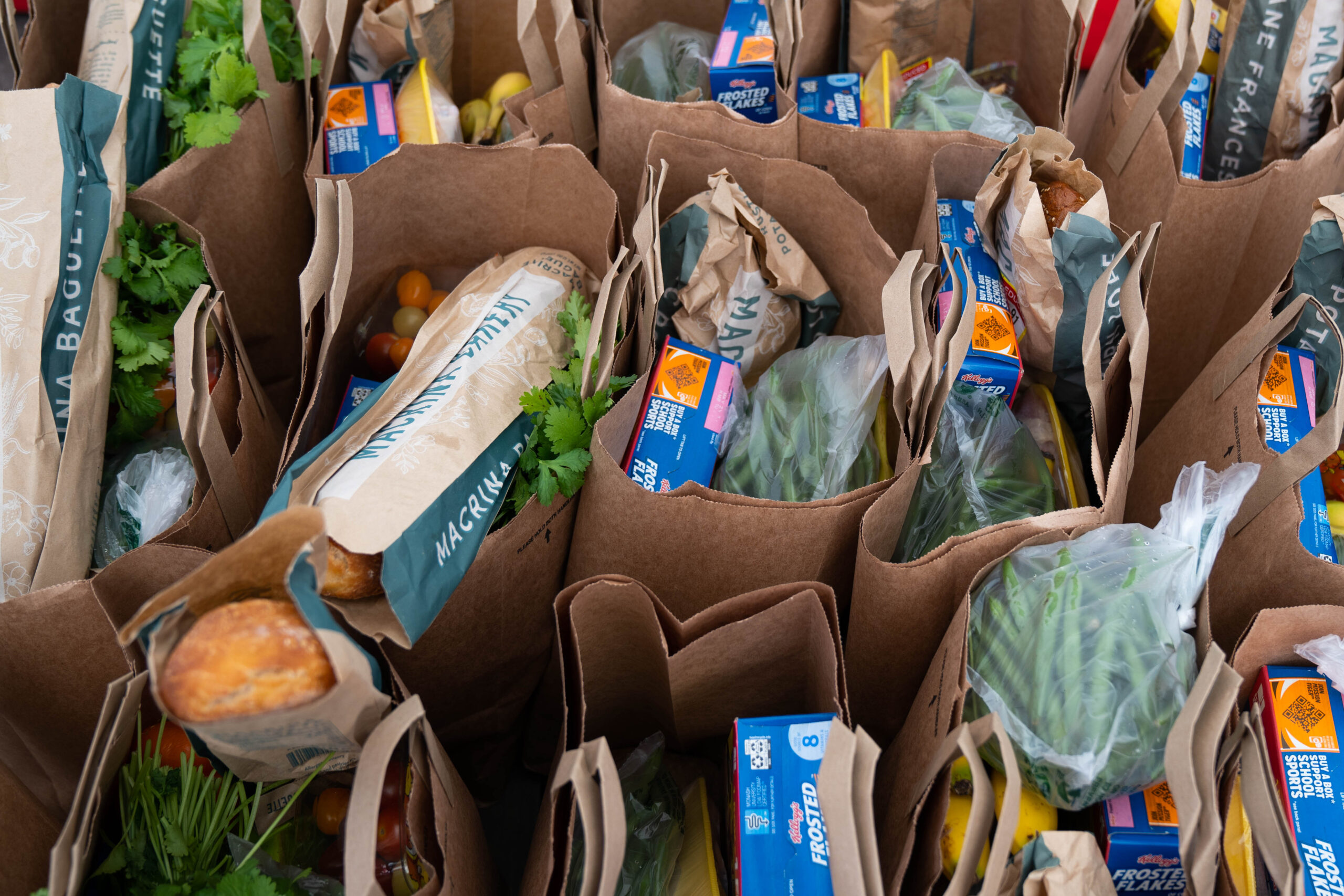
Image Alt Text: Top down view into multiple paper grocery bags filled with vegetables, cereal, bananas, meat, and fresh baked bread.
More Seattle food banks are meeting people where they are – at home
Four years ago, when the COVID pandemic first struck, thousands of Seattle families were suddenly unable to make their weekly trip to the neighborhood food bank, which for many meant not having to choose between skipping a meal and coming up short on rent.
Seattle’s network of food banks had to rapidly rethink how they did their work, coming up with new and creative ways to get food to people unable to leave their own homes. To meet the rapidly growing need, the Seattle Food Committee worked with Solid Ground and King County Metro to put its fleet of ACCESS paratransit buses into service transporting groceries instead of people. Similarly, United Way of King County (UWKC) partnered with DoorDash to deliver food directly to families’ front doors.
That quick action and collaboration kept folks fed during the most dire and isolating moments of the pandemic, but it also highlighted another reality: Even before COVID, many people in Seattle who struggled to get enough food weren’t able to make it to a food bank because of disabilities, work hours, family obligations, and other obstacles.
But suddenly, thanks to the pandemic, they had an option for getting the food they needed.
“I did not expect we’d still be running home delivery four years later,” says Sara Seelmeyer, UWKC Associate Director for Ending Hunger. “But what we learned is a lot of people really valued the program for reasons beyond just COVID safety.”
Read More
Food stability at your doorstep
Not only have many Seattle food banks continued to offer home delivery as the danger of the pandemic has waned, some have expanded their programs and are innovating new ways to serve people who are unable to come in person.
UWKC, which continues to partner with 12 Seattle food banks to provide delivery services through DoorDash, coordinated more than 56,000 home deliveries in the city in 2023 alone, serving nearly 1,700 households. Many food banks now have a waitlist for home delivery.
Here’s how it works: Anyone who’s unable to go to the food bank for any reason can contact UWKC or their neighborhood food bank and fill out a form with information about their family size, dietary restrictions, cultural preferences, and any needs for home essentials, like diapers, baby food, and hygiene items.
Every week or every other week, neighborhood food bank staff and volunteers pack customized boxes with fresh produce, meat, dry goods, and more – depending on what’s available – while trying their best to accommodate each household’s preferences. They then hand the box over to a DoorDash or volunteer driver, who delivers it directly to the family’s front door.
“We want each box to have a balance, and we want it to last a full week,” says Leon Forde, Market Coordinator at Byrd Barr Place.
A different way to provide food access
These kinds of home delivery programs proliferated during the early months of the pandemic, but some got their start years earlier as food banks recognized that traditional models for addressing food insecurity were still out of reach for some people.
Rainier Valley Food Bank (RVFB) has been delivering groceries to homebound residents for more than a decade, while North Helpline started its program in 2019 serving about 75 people each month. Today, that number has grown to around 920.
“It’s about looking at other ways to alleviate the fear of not having enough food,” says Nathan Meacham, Food Access Coordinator at North Helpline. “This is one more way to do it.”
The service has become a lifeline for a wide variety of people in Seattle, including those with disabilities and compromised immune systems, single mothers without daycare, workers with inflexible schedules, and anyone who doesn’t have the time or means to go to a food bank during set hours and wait in line for their turn to pick out groceries.
“The majority are people who have lost mobility in some way, so they’re more homebound than they were,” Nathan says. “They call because they may have come into the food bank before, but now it’s a burden for them.”
“Someone called last week just to say thank you. He said this program saved his life – that without it he wouldn’t have been able to eat the last few years.”
~Chloe Finkenbine, RVFB Home Delivery Program Coordinator
Home delivery is also seen as an important tool for addressing food equity, helping to reach communities that have historically been underserved by food access programs. Nearly 60% of households served by UWKC’s home delivery program identified as people of color, according to a 2021 University of Washington analysis, and about half had someone in the house with a disability.
People who use the programs often report that they’re grateful to have reliable access to food – something they can count on weekly or every other week. For some, it’s a source of stability when other things in their life may feel out of control – and it may mean the difference between eating and going hungry. “A lot of our clients, they’re just really grateful,” says Leon at Byrd Barr Place. “If we don’t deliver the food, they might not eat.”
“Someone called last week just to say thank you,” says Chloe at Rainier Valley Food Bank. “He said this program saved his life – that without it he wouldn’t have been able to eat the last few years. I just hear stuff like that all the time from the volunteer drivers and clients.”
The programs are meant to be low barrier, so people signing up don’t have to prove their income or any kind of disability. However, they are asked to give a reason why they’re unable come to the food bank during regular hours, and they’re encouraged to make it in if they can.
“We want to reach as many people as possible, so we still want people who can come in to come in,” says Leon at Byrd Barr Place.
Online ordering comes to the food bank
There’s one big reason why most food bank users will still want to come in if they can: If they shop in person, they’re able to fill up their cart or basket with as much of whatever they like. For home delivery, food banks are currently limited in how much they can customize a box for each household and how much they can fit in it.
Rainier Valley Food Bank (RVFB) is working to change that. In partnership with Jewish Family Service (JFS), the food bank has piloted an online ordering system called Tri-River Market that allows users to pick individual items for their weekly delivery.
“If someone wants to order 100 onions in a week, they are totally free to order 100 onions from us – as long as we have the inventory,” says Chloe Finkenbine, RVFB Home Delivery Program Coordinator.
In addition to giving home-delivery recipients more options, Tri-River Market is designed to further food-access equity by overcoming any stigma that might keep some people from visiting a food bank even if they’re having trouble getting enough to eat. Deliveries come in unmarked paper bags, so there’s no indication they came from a food bank.
Brian Sindel, JFS Food Bank Manager, says the organization partnered with RVFB on the project to better serve close-knit Jewish communities that have not traditionally used food bank services because of the stigma.
“We know that this community has not accessed JFS services in the past, primarily because the Jewish community is very small and it may not feel like you can go to something like a food bank without seeing someone you know,” Brian says. “The families in this community are quite large, and because food is getting so expensive in Seattle – especially kosher food –it can be a real burden.”
Need outpaces capacity
Home delivery wasn’t an option at most food banks four years ago, but it has already become so popular that many organizations have reached capacity and now keep running waitlists. UWKC currently has more than 1,000 households on its home delivery waitlist and warns new applicants to expect “extremely long wait times” depending on their area. North Helpline has a waitlist as well, while RVFB recently shifted resources so it could offer delivery to about 60 people who had been on its waitlist.
On the other hand, Byrd Barr still has capacity for home delivery and continues to sign up more people. “We can add them on pretty quick,” Leon says. “They don’t have to wait for weeks or months.”
The biggest thing food banks say they need to increase delivery to more homes is the support of additional volunteers, both to pack boxes and deliver them. Many organizations are actively recruiting volunteers and hope to be able to reach more people soon.
Whatever happens, it’s clear that home delivery is now a fixture in the response to food insecurity.
“The program has really shown that there are different ways of doing things — that the emergency food system is more malleable than we realized it was,” says Sara at UWKC.
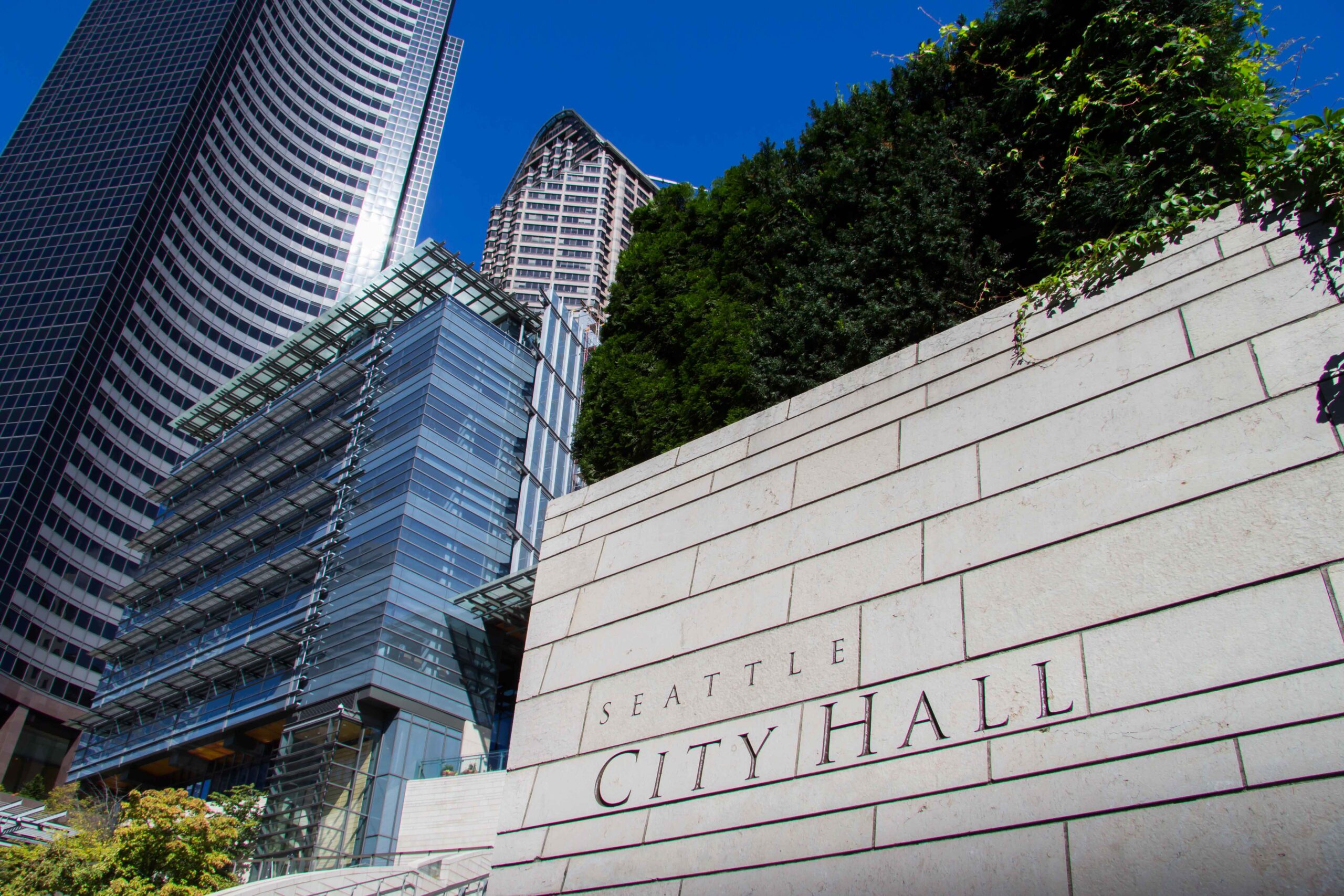
Image Alt Text: Close up of Seattle’s City Hall sign. The sign is made of large smooth tan bricks with the words “Seattle City Hall” carved into the stone in capital letters. In the background there are stairs leading up to the city hall building, and a little farther away, three tall skyscrapers against a blue sky.
SFC Wage Equity Statement
The Seattle Food Committee believes that food bank staff should be compensated fairly and strongly supports efforts towards achieving wage equity for workers in the emergency food system. A recent analysis by the University of Washington revealed that human service workers make 37% less than other workers with identical skill sets working in other sectors of the economy.
The knowledge, skills, and experience required to do the work in our field are important to recognize. The skills that people bring to this work are similar to the skills that people bring to the private sector – financial management, creativity, significant management and operational responsibilities. Beyond this, in our field, we work closely with populations who have been marginalized, oppressed, and face significant trauma in their daily lives. It requires us to be strong communicators, collaborators, and managers of volunteers with a range of their own skills, experiences, and contributions.
Our agencies are tasked with meeting the present need of and formulating the solution to one of the biggest crises facing our region today, hunger.
Read More
According to the University of Washington’s Wage Equity for Non-Profit Human Services Workers report, women make up almost 80% of workers in human services, and Black/African-American workers are nearly three times as likely to work in human services than in non-care jobs. The UW team sought to understand why wages are lower in human services than in other sectors, they found there were five main penalties that suppressed these wages:
Sexism.
Racism.
Care work is undervalued.
Clients have low power.
Nonprofit sector wage suppression from public subcontracts.
When we have staff who are compensated fairly and engage in this work for the long-term, we can be a more effective force for change and provide the solutions to these crises that are facing our community.
No matter how rewarding it is to be engaged in this vital work, chronic underpayment is a major disservice to our staff and community. Frequent turnover as a result of low paying jobs hinders our agencies from achieving our missions and hurts our community when relationships are cut short.
Elected officials and funders recognize that our work is essential for our community to thrive. We know our community needs and depends on our agencies for safe, reliable, and culturally appropriate food access. Yet, the funding we receive does not allow us to compensate our staff at levels that recognize the value of their labor. In many cases our staff are not compensated at levels that recognize the cost of living in Seattle.
We stand in full solidarity with the Seattle Human Services Commission’s city budget priorities. We applaud City Council’s passage of a resolution this year to take action on wage equity for human services workers and we are encouraged by responsive and swift actions to the care worker crisis in our city. We stand in support of the Mayor and council’s recent actions to add a 2% increase for wage equity efforts on top of the cost of living adjustment for human services contracts required by law. This is a strong start to work that must continue and be carried by us all. We urge funders to lead by example and fund the true cost of operating food banks and support an emergency food system that can meet the complex needs of our community. Paying equitable wages will allow our agencies to focus on their missions, maintain consistent staff to build essential relationships with our clients, and end the perpetuation of undervaluing food access and human service work.
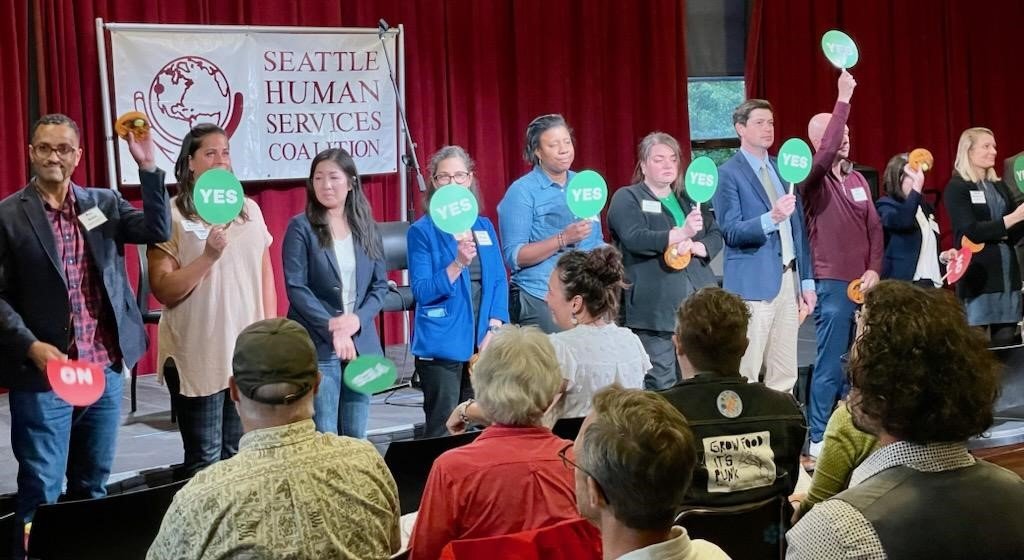
Image Alt Text: A group of 10 people stand on a stage while a crowd watches from their seats. Eight of the people on the stage are holding up green and white signs with the word “yes” written on them, two people hold up plastic waffles instead of a sign.
Note: This is a repost from the Ballard Food Bank’s blog. Minor changes were made to the article for our blog with the author’s permission to increase the relevancy to the Seattle Food Committee. You can read the original article here.
Community and Candidates Come Together to Discuss Human Services Issues
We were thrilled to have so many of our community members pack the house for the Seattle Human Services Coalition (SHSC) Candidate’s Forum with moderator Marcus Harrison Green in September. It was a great reminder of how much our neighbors care about the city, region, and each other. We also appreciated the opportunity to come together and hear what’s on the minds of voters, candidates, and others as we head into the fall elections for Seattle City Council and King County Council.
Couldn’t catch the forum live, or want to refresh your mind on candidate responses? Watch the full video on the Seattle Human Services Coalition YouTube channel.
The Seattle Human Services Coalition brings together organizations including senior centers, youth afterschool programs, housing and shelter services, food banks, disability services, and much more for a more holistic approach to meeting the community’s needs and challenges. Ballard Food Bank is part of Seattle Food Committee, one of the member coalitions that make up SHSC. Ballard Food Bank’s Executive Director, Jen Muzia, is a co-chair of the SHSC, while Senior Manager of Community Advocacy and Outreach, Nathaniel Lyon, was on the planning committee for this event.
Read More
Questions from the coalition and attendees covered a broad range of human services issues, from supporting increased services for survivors of gender-based violence, to ensuring equitable food access, from protecting the tree canopy and addressing heat islands in the city, to addressing the lack of affordable childcare.
The forum included one-on-one time for the candidate pairs from each district to answer specific questions as well as a lightning round where candidates responded yes, no, or waffle to questions ranging from police accountability to if childcare workers should receive subsidies regardless of income. All candidates answered yes to most of the lightning round questions, with a couple of candidates waffling on a question about pursuing more progressive revenue sources for the city.
On one key initiative for the Seattle Human Services Coalition and for the Seattle Food Committee – wage equity and living wages for human services workers – all candidates indicated support for additional city funding to human services providers for this work.
Nearly all candidates for current city and county council races were present for the forum, including current city council members who arrived late after passing legislation around prioritizing drug treatment and addressing public drug use.
The two candidates not attending were Sofia Aragon, running for King County Council District 8 against Teresa Mosqueda, and Pete Hanning in the City Council District 6 race against incumbent Dan Strauss. Another way to hear from the candidates on these issues is their responses the written survey from SHSC earlier this year. For the candidates not attending the forum, Aragon provided responses to the survey and Hanning has not.
While there are no other forums or debates planned to focus on human services overall, voters and community members wanting to hear more from City Council candidates about their views and plans around homelessness can check out the recordings of the 2023 Homelessness Debates hosted by KNKX and We Are In.
We encourage our neighbors to dig deep into candidate plans for human services in our community and make your voices heard as we work toward a more equitable future for Seattle and King County.
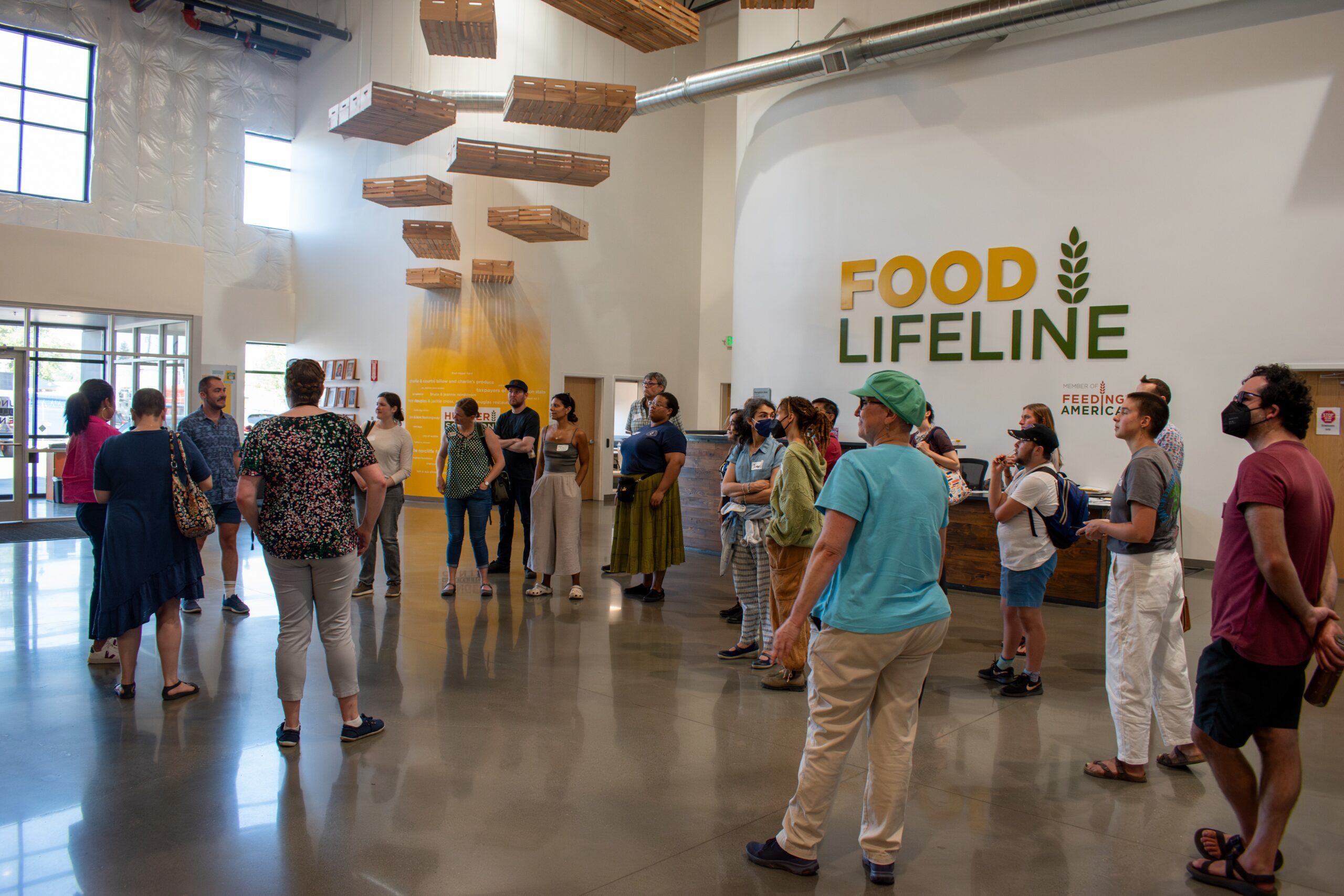
Image Alt Text: A tour group of about 20 people standing in Food Lifeline’s brightly lit lobby listening to someone speak.
The Seattle Food Committee’s 2023 Van Tour
It’s not every day that our committee gets together to share a lunch at an urban farm, explore massive warehouses and walk-in coolers, or sit in a traffic jam on highway 99 in a transit van with one another – but it does happen every year!
After a four-year hiatus the famed SFC Van Tour made its grand return in August. The van tour is a celebrated tradition dating back to 1998 and our committee members were elated to participate again.
The tour is organized by Solid Ground and is an equally entertaining and educational adventure through King County stopping at various food access organizations: a field trip for food justice adults!
Read More
For this year’s tour, our committee met at Food Lifeline before embarking across the City in a Metro Access van to Ballard Food Bank’s new location. Ballard Food Bank re-opened two years ago in a space built from the ground-up and what a treat it was for us to see. The shopping area is very spacious and designed just like a grocery store, allowing for a familiar and dignified shopping experience. The building also houses their kindness café that serves up delicious, hot meals – on the day we visited the menu included a frittata with roasted veggies and feta cheese!
Our next stop was at the Rainier Valley Food Bank (RVFB). Here we got to learn about the many, exciting projects underway. Currently, RVFB is operating out of their new home, a space they just moved into just last year. As the busiest food bank in the City, RVFB required a food bank with more square footage to allow their guests a more comfortable shopping experience. And yet, RVFB remains ever more ambitious as they will soon embark on building out a brand-new food bank, much like the one we visited in Ballard, but with their own touches.
Our group then made the short journey to The Rainier Beach Urban Farm and Wetlands (RBUFW), where we explored their growing areas, greenhouses, fruit orchards and had a delicious lunch. We learned about RBUFW’s varied and impactful community programs including their farm stand, CSA, community kitchen dinners, workshops, and free foraging from their fruit orchard.
We then journeyed over to visit Cultivate South Park, an incredibly inspiring resident-led, community development organization that spearheads multiple projects. We learned about their food access initiatives including the Urban Fresh Food Collective and El Mercadito Farmer’s Market. We were also treated to delicious, freshly cut fruit – the perfect refreshment as the weather started to creep up to the 90’s!
For our final stop, we went back to where it all started at Food Lifeline. Here we took a tour of their massive and immaculate Hunger Solutions Center. A facility where food that all our member agencies receive is shipped, packed, and stored. We carefully navigated the endless rows of palletized food as forklifts zipped by. We also took a quick tour of the building that will be home to the future South Seattle Community Food Hub, a space that will help connect local farmers with food access organizations (I’m sure there will be a blog post about this in the future!)
It was a long day, one full of connecting, learning, and eating with one another. Our van tour this year brought to the forefront just how varied our region’s approach to food access and food justice is. Each approach plays a different role and is vital to addressing the food needs of the Seattle area. The process of supporting, learning, growing, and working with another is the embodiment of what the Seattle Food Committee aims to achieve. We are very thankful for Solid Ground as the organizer, to all the organizations who hosted us this year, and the City of Seattle for continuing to fund the SFC Van Tour. We are already looking forward to SFC Van Tour 2024!
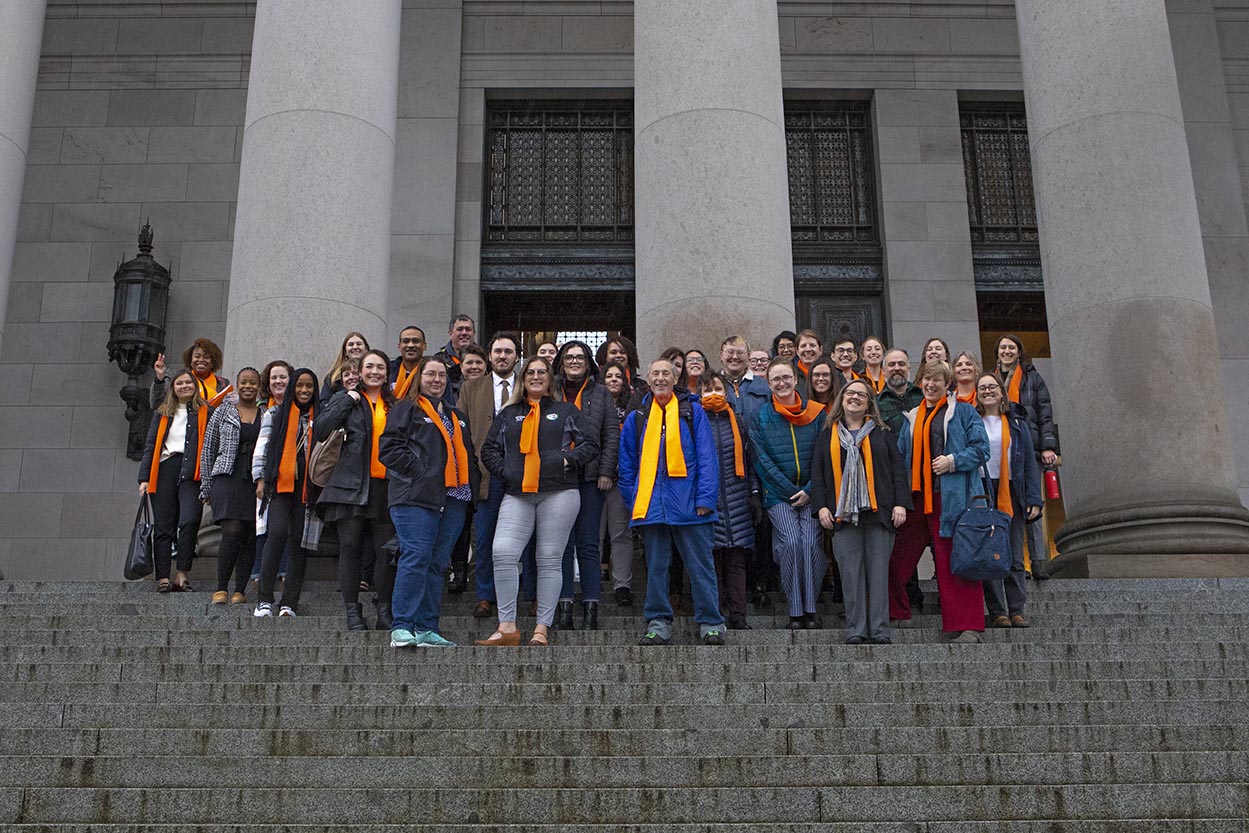
Image Credit: Laila Al-Agha, Northwest Harvest
Image Alt Text: Large group of about 40 people wearing bright orange scarves standing on the dark grey concrete steps leading up to the entrance of the state Capitol building.
How Many Food Justice Advocates Does it Take to Change a Broken System?
On February 7th, the Seattle Food Committee (SFC) participated in Hunger Action Day, an annual event where anti-hunger advocates from across Washington State gather in Olympia to meet with legislators to discuss policy and budget investments. The day is organized by the AntiHunger and Nutrition Coalition, an SFC affiliate member.
Many SFC member agencies made the trek down to Olympia for in-person meetings (while others participated virtually), thanks to a vanpool organized by Solid Ground. Our members were able to speak with their legislators and share first-hand accounts of how hunger impacts their community and the people they serve at their respective agencies.
Read More
Every year the event organizers determine a full slate of issues to prioritize, and this year that included: providing school meals at no cost for all students in Washington, Hunger Free Campuses to ensure that college and community college students meet their basic needs for food and other essential needs, investing more funding in the Fruit & Vegetable Incentives Program to increase the affordability of nutritious food, and increasing support for We Feed Washington and our emergency food system.
The question at the beginning of this blog post will remain rhetorical until we have a system that truly meets the needs of everyone in our state. Though we do know the more food justice advocates we can bring together, the more we can make our voices heard and grow our impact. In that spirit, we hope to see you in Olympia for Hunger Action Day 2024!
To learn more about the issues and stay up to date, please visit Northwest Harvest’s list of Legislative Priorities.

Op-Ed: Seattle Needs to Fully Fund Our Food Banks
Will eggs or milk make it into the shopping cart this week? Is there enough room in the budget this month to cover the increased cost of gas? We are well aware that Americans are asking themselves these questions every day. What some might not realize, is that food bank managers and directors must ask themselves these same questions as they order food for their programs. Including those right here in Seattle. As a result of inflation, food banks have been forced to make painful decisions such as cutting back on food at a time when families need support the most.
We, as members of the Seattle Food Committee, know this firsthand. Our Committee is a coalition of 27 Seattle-based food banks that work together to share resources, procure nutritious food, and educate our community to strengthen our emergency food system and end hunger in our region. As food bank operators we have been forced to be as resourceful as possible over the last 2 ½ years as we served record numbers of people during the pandemic. Some of our coalition agencies have seen visits to their food banks double and even quadruple.
Our food bank network has shown great resilience, as has the community we serve, while the effects of the pandemic are still deeply felt. Unfortunately, the impacts of inflation are putting increased strain on an emergency food system in Seattle that has already been stretched to its limit.
Read More
Inflation has hit the country hard, and Seattle has not been spared. This year the Seattle area saw an inflation rate of 9%. More troubling, inflation has not hit equally across consumer goods. Foods that are staples of healthy diets have seen costs rise well beyond the 10% mark. For example, our member agencies are reporting a doubling in cost of both milk and eggs.
What does this look like in real terms? It’s a family of four not being able to afford a carton of eggs at the store with their limited SNAP benefits. It’s that same family going to their local food bank to learn that the food bank couldn’t order eggs for the week either and the hope that next week they can.
It’s a homebound adult attending a nutrition class, and afterward feeling the immense frustration that their SNAP benefits are no longer enough for them to purchase the foods they were advised to buy and that their food bank deliveries have gotten smaller.
Deciding how to prioritize a stretched budget is not an easy task for an individual, family, or organization to make. For every agency in our committee the choice to reduce the amount of food available is a last resort. For this reason, we do everything within our power to prevent our guests’ needs from going unmet, but we must ask ourselves: is this sustainable?
Seattle’s emergency food system, and many other social services, are facing a budget crisis as a result of Mayor Bruce Harrell’s proposal to cap human services contracts at a 4% increase – out of step with the law he helped pass as a councilmember. By not following the law, food banks and human services organizations are being handed a cut and will likely have to reduce services as a result. We need support to ensure we can keep pace with the increased costs of providing critical services to our community, and in the form of investments that build the capacity of our food system to equitably address this increased need in our community. We call on the City to follow the budget recommendations put forth by the Seattle Human Services Coalition and to have our City contracts reflect the true level of inflation.
The funds our agencies receive from the City allow many of us to pay for our small staff. Our staff who, as essential workers, kept food banks open during the height of pandemic lockdowns. The funds also allow our agencies to purchase the nutritious, culturally relevant food that can be the only source of food for some households.
We are all stronger when everyone in our community has access to healthy food. As community members, you can take action by donating and volunteering with your local food bank, as well as by letting your city councilmember know that it is critical to pass a city budget that reflects the true level of inflation. Together, let’s make sure everyone has access to milk, eggs, and healthy produce throughout the year.
FamilyWorks Mobile Food Pantry
In the spring of 2021, FamilyWorks rolled out their Mobile Food Pantry program to address widening access barriers. By bringing both food and essential resources like hygiene supplies, diapers and benefit sign-ups, the Mobile Pantry takes a holistic approach to address basic needs and take steps toward longer-term stability. The Mobile Pantry is also dedicated to providing culturally-responsive and diet-specific options catered to each location.
For more information on the Mobile Pantry, please reach out to Tobey Solomon-Auger 206-694-6722 or tobeys@familyworksseattle.org.
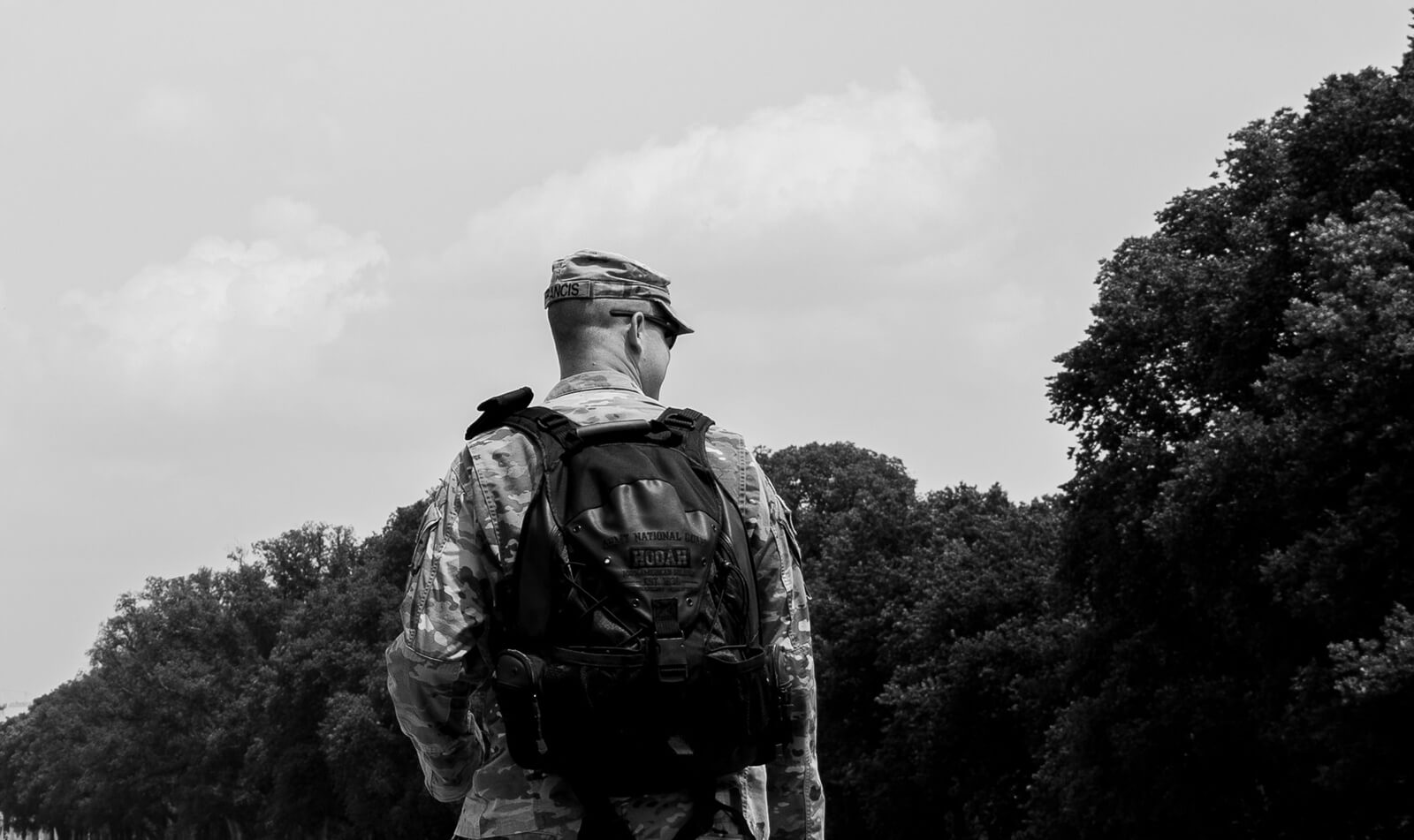
A Salute to the National Guard
I was skeptical when the National Guard first showed up at our food bank in March of 2020. With the pandemic just beginning, they had come to help the most vulnerable in our city. At the time, I held a generally dim view of the military.
Our goal at Byrd Barr is to change lives. We work to feed our communities. We make sure that anyone who knocks at our doors has access to healthy, delicious, culturally appropriate foods with little to no barriers. How was this going to work? How would we find common ground with the National Guard when our values appeared to be in direct conflict?
However, working together, side by side at our organization, we learned a fundamental and impactful lesson about the power of collaboration and keeping an open mind. In fact, we would not have been able to meet the needs of our community without the extraordinary and dedicated help of our Guardsmen.
Read More
And in turn, they also learned from us. Most of the Guardsmen I met had never been to a food bank. They had never heard the words “food insecurity” or “food justice” or seen the long lines that sometimes stretched around corners, or the faces of people who utilize our service.
Several guardsmen told me they regarded this experience as the most extraordinary mission they had ever undertaken. I realized that our Guardsmen wanted to help people. The bonds between us formed quickly. The depth of their commitment became clear to me one day when I realized the food bank was being sustained almost entirely by the National Guard. As the pandemic became more of a reality and the number of our clients continued to rise, we met their needs thanks primarily to Guardsmen. When our community had to quarantine for months, the Guardsmen came to the front lines to make sure people who needed our services received it. It was an extraordinary experience to witness.
In the summer of 2020, when the BLM movement swept across Seattle, the National Guard’s mission split; some continued to work with us, while others went to the protests. I became concerned. The uniform they signed up to wear had become a target in Seattle. The same folks that were unpacking and sorting thousands of pounds of food for our community was also holding a forceful line against protesters in our city. How were we supposed to reconcile these seeming contradictions?
I found myself in a unique position to ask those questions to the Guardsmen I had spent the last few months with. In their answers I found something with them that I suspect most of humanity believes. It’s a feeling that we all share that somehow gets lost in our differences. We all want a peaceful, healthy life. We all want access to the things that make us feel human. We all want to be warm and nourished so that we can pursue those fruits of being alive.
Despite our differences, something changed when we decided to work together to serve our community. Thank you to all the Guardsmen who came to the front line with us. The National Guard distributed millions of pounds of food to a nation of people in the throes of the pandemic. The Guardsmen who showed up every day, we salute you and your service.
The viewpoints expressed in this article represent the opinion of the author and does not necessarily represent the viewpoint of Seattle Food Committee.
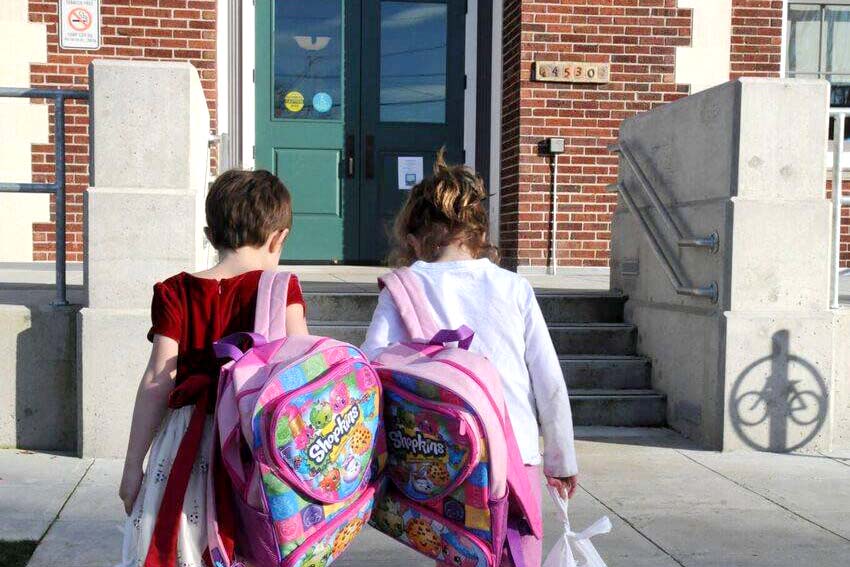
Food for Schools
Food for Schools was created out of a Backpack Summit hosted by the Seattle Food Committee in September 2013, where hunger relief organizations convened to address the problem of childhood hunger. The group formally convened in November 2013 and meets once a month to discuss best practices, share resources, and develop standards for weekend hunger relief efforts for children in Seattle. The group brings together over 10 different organizations to collectively work on ending childhood hunger. Mostly food banks, one sole agency, and one meal program, come together and work collaboratively to benefit us all. Anyone is welcome at our meetings, whether it’s just to come learn, or to share a program. We’d love to have you.
The McKinney Vento Federal Act uses the definition “individuals who lack a fixed, regular, and adequate nighttime residence” to identify homeless students within the district. We have seen a higher need since the start of the pandemic. We define weekend hunger bags as child friendly, easy to cook food for a child to feed themselves. With 2 full days of food, a minimum of 6 meals, from 3 food groups. They are meant to support the individual student, but we know the bags are shared with other family members.
Read More
Due to school closures in response to Covid-19, we had to pivot our operations from delivering to school partners to delivering 4,000 bags to the Seattle School District offices, and their 40 meal sites. We are now back to pre-pandemic school partnerships and independent distribution. All schools in Seattle are paired with one of the Food for Schools agencies, and several agencies are now serving beyond Seattle Public Schools and into multiple school districts and some private schools.
A big challenge of the pandemic has been the supply chain. For a lot of us, actually getting the food has been the hardest part. One of our biggest providers stopped stocking our backpack items altogether. Even the big distributors have been out of stock of a lot of our regular bag items, making it difficult to create healthy nutritious bags. We have had to be creative in the seeking of new items, finding new distributors, and developing alternative menus, that still meet the needs of the students we support.
But through it all, Food for Schools has come together, supported each other, shared resources and ideas, always with the thought of providing the best bags possible to the most students, to help them fill their bellies one weekend at a time!
To learn more about the Food for Schools, attend a meeting, or donate, please reach out to Nichelle Hilton at nichelle@backpackbrigade.org